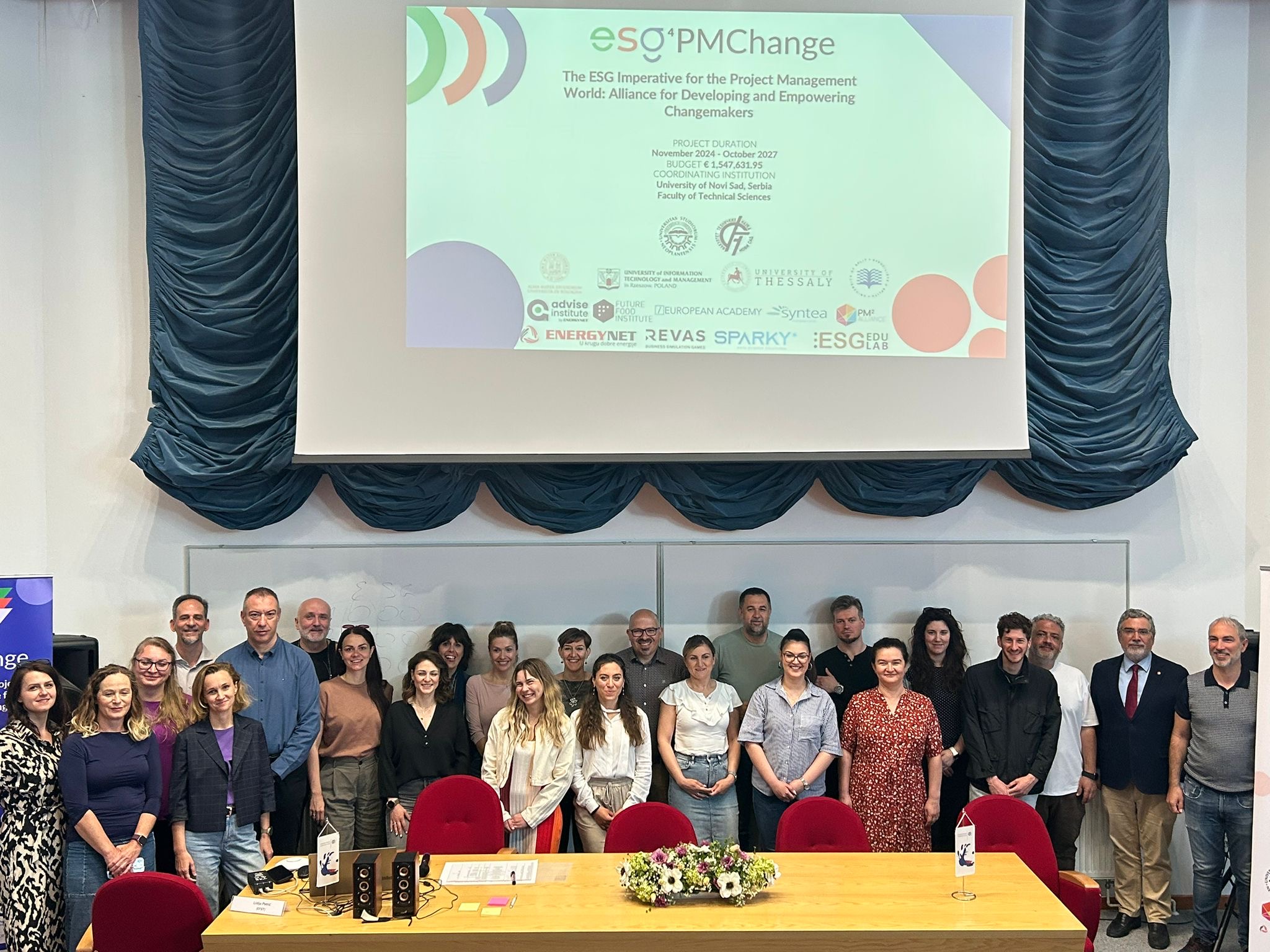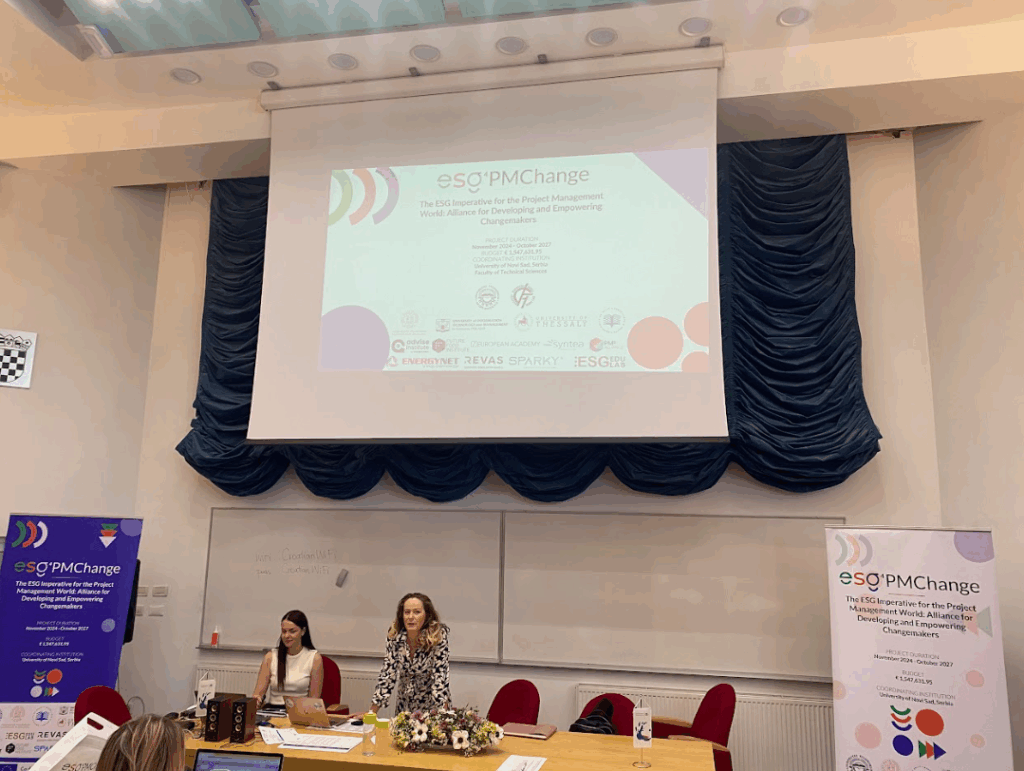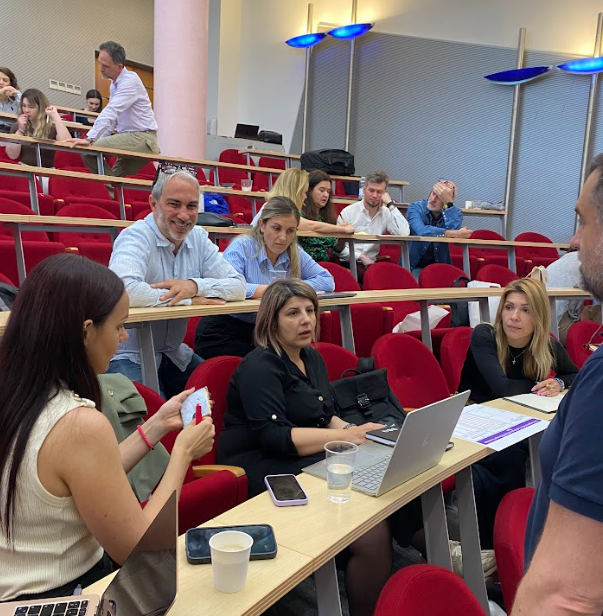The transnational project meeting for ESG4PMChange took place from May 19–20, 2025, at the Faculty of Economics, Business and Tourism in Split, Croatia. The event served as a pivotal moment for consolidating project progress and launching the next phase of implementation, gathering representatives from all partner institutions across higher education, business, and training sectors.

From Analysis to Action: Laying the Groundwork for ESG-Driven Education
The meeting began in an atmosphere of collaboration and shared vision, with welcoming remarks from Prof. Dr. Danijela Ćirić Lalić (University of Novi Sad) and Prof. Dr. Ivana Bilić (University of Split). Together, they reflected on how far the project had come and emphasized the importance of building a solid foundation for what lies ahead.
Much of the day was dedicated to exploring the outcomes of the project’s second work package. Partners took time to revisit and reflect on the two key deliverables developed so far — the State-of-the-Art Report, which maps the current landscape of ESG in project management, and the Competency Framework with Professional Profiles, which sets the stage for defining the skills future project leaders will need.
Rather than simply reviewing these results, the discussions focused on how we will meaningfully shape the next phase of the project, especially in designing educational tools that are both forward-looking and grounded in real-world needs.

“This meeting in Split was a key milestone for our project — a moment to translate analysis into concrete steps. I’m especially proud that, as partners, we demonstrated a strong commitment to shaping educational tools that respond to real needs and future challenges.” — Prof. Dr. Danijela Ćirić Lalić, Project Coordinator, ESG4PMChange, Faculty of Technical Sciences, University of Novi Sad
Collaborative Workshop: Turning Knowledge into Action
One of the most engaging moments of the meeting was the interactive workshop dedicated to exploring how the project’s results could be brought to life beyond the consortium. In an atmosphere of open dialogue and creative thinking, partners came together to discuss how the findings from the State-of-the-Art Report and Competency Framework could be translated into real value for different stakeholders.
Through guided activities, participants worked in groups to map key national stakeholders, define concrete value propositions, and sketch out ideas for tailored exploitation strategies in their own countries. Rather than staying within the boundaries of project reporting, the conversation shifted toward the bigger picture: how these tools and insights can support broader transformations in education, business, and policy.
This session not only strengthened partner collaboration but also sparked new ideas for ensuring that the ESG4PMChange knowledge base will have a lasting, practical impact across sectors.

Designing What Comes Next: Micro-Planning the Learning Journey
The afternoon sessions shifted focus toward the future — specifically, how the project’s insights will shape the educational tools and experiences to come. Led by the University of Bologna, Syntea, and SSA Group, partners rolled up their sleeves for a deep dive into the practical aspects of curriculum planning for the upcoming Course Learning Environment (COLE).
Through lively discussions and joint planning, the group worked on outlining the course structure, setting clear timelines, and defining the roles each partner will play in bringing the curriculum to life. A particularly inspiring part of the session was the introduction of the micro-credentials framework — a system designed to recognize and validate new competencies in flexible and innovative ways.
Partners were introduced to digital badge systems, explored their compatibility with EU standards, and even got a glimpse of VR-based learning environments as a forward-thinking approach to training delivery. The session highlighted not only the technical aspects of implementation, but also the project’s shared commitment to making ESG education more engaging, accessible, and future-ready.
Day Two: Strategy, Visibility, and Scientific Ambition
The second day of the meeting brought a shift toward big-picture thinking, with a focus on how the project’s work will be shared, scaled, and sustained. Partners engaged in strategic planning sessions to map out key dissemination and exploitation actions for the next six months, ensuring that each work package stays aligned and visible.
A highlight of the day was the collaborative brainstorming around scientific publications, where partners exchanged ideas on how to translate WP2 insights into impactful academic outputs. The enthusiasm for joint authorship and cross-border research echoed the project’s ambition to leave a lasting mark both in practice and in scholarly circles.
“The strength of this consortium lies in our willingness to co-create — not only tools and curricula, but new knowledge that travels beyond borders.”
With strong momentum and a clear roadmap ahead, the ESG4PMChange consortium leaves Split more aligned, connected, and ready to turn vision into action. The meeting reaffirmed a shared commitment to shaping sustainable, forward-looking project management through education, collaboration, and innovation.

